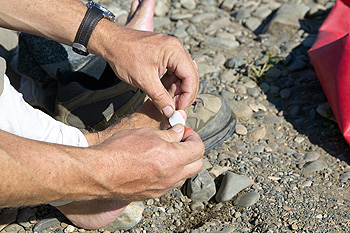
Many people enjoy walking and may be concerned about blisters developing on their feet. Blisters produce pain and discomfort and may also cause the gait, or walking style, to change. Blisters are often caused by excess friction due to the shoes and socks that are worn. A common place they develop is on the back of the heel as the foot rubs against the shoe. With enough friction, a bubble forms that is filled with a protective liquid to protect the damaged skin. The bubble will gradually drain as new skin forms under it, and a bandage may be worn to help prevent it from popping prematurely. There may be existing medical conditions, like psoriasis and eczema, that can cause a blister to form. Frostbite, extreme sunburn, or an allergic reaction to an insect bite may also result in a blister. If you would like to learn about effective blister prevention methods, it is suggested that you confer with a podiatrist who can provide you with the information you are seeking.
Blisters are prone to making everyday activities extremely uncomfortable. If your feet are hurting, contact Anas Khoury, DPM of North Eastern Foot & Ankle Specialists. Our doctor can provide the care you need to keep you pain-free and on your feet.
Foot Blisters
Foot blisters develop as a result of constantly wearing tight or ill-fitting footwear. This happens due to the constant rubbing from the shoe, which can often lead to pain.
What Are Foot Blisters?
A foot blister is a small fluid-filled pocket that forms on the upper-most layer of the skin. Blisters are filled with clear fluid and can lead to blood drainage or pus if the area becomes infected.
How Do Blisters Form?
Blisters on the feet are often the result of constant friction of skin and material, usually by shoe rubbing. Walking in sandals, boots, or shoes that don’t fit properly for long periods of time can result in a blister. Having consistent foot moisture and humidity can easily lead to blister formation.
Prevention & Treatment
It is important to properly care for the affected area in order to prevent infection and ease the pain. Do not lance the blister and use a Band-Aid to provide pain relief. Also, be sure to keep your feet dry and wear proper fitting shoes. If you see blood or pus in a blister, seek assistance from a podiatrist.
If you have any questions, please feel free to contact our office located in Passaic, NJ . We offer the newest diagnostic and treatment technologies for all your foot care needs.
